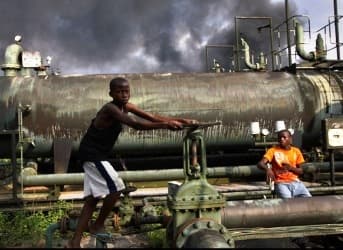If it is not common for insurgencies to telegraph their intentions in advance, as it can provide defenders with valuable early intelligence, then Nigeria’s Movement for the Emancipation of the Niger Delta is no ordinary insurgency. MEND has given the nation's second largest oil producing company, Chevron Nigeria Ltd until 1 October to evacuate the Escravos Terminal and Tank Farm facility or face imminent attack.
On 6 September MEND spokesman Jomo Gbomo said that his insurgent colleagues would begin mortar attacks on the multi-billion dollar oil facility after the deadline expired.
Gbomo’s statement to the press remarked, "MEND is so far satisfied with the steady destructive progress of 'Hurricane Exodus' which has reduced Nigeria's oil output significantly through our sustained sabotage of pipelines. We will also continue to turn a blind eye to the crude oil merchants passing through our territories because their activities, apart from toll paid us, is helping to achieve our objectives of zero oil output by 2015. We use this medium to advise workers at the Chevron Tank Farm in Escravos to evacuate the premises as mortar attacks are imminent on Tuesday, October 1, 2013 from 00:01 hour Nigerian time."
Why 1 October?
Nigeria’s Independence Day.
Related article: Libya: the Fundamental Feeding the Fear
Chevron Nigeria Ltd is Nigeria’s second largest oil producer.
Nigeria, Africa’s most populous nation, should be black Africa’s biggest success story. A member of the Organization of Petroleum Exporting Countries, Nigeria currently produces 2.5 million barrels per day (bpd), making it Africa’s largest oil exporter and the world’s 14th largest oil producer. With oil running at roughly $100 per barrel, that generates $250 million in income per day, or $19.25 billion annually, give or take a few naira, probably more, as Nigeria regularly evades its OPEC quotas. Such oil revenues should provide more than a modicum of prosperity for Nigeria’s 160 million citizens. The country’s oil sector provides 95 percent of Nigeria’s foreign exchange earnings and about 80 percent of the government’s budgetary revenues.
But despite the massive oil revenues, 80 percent of Nigerians live on less than $2 a day, while across Nigeria, public services have deteriorated and poverty is growing, sharpening ethnic divisions and fostering bitter parochial politics in which ethnic group’s clans and sub clans battle for the remaining national revenue pie.
The scope of the thievery of oil revenues by Nigeria’s elite is staggering. In 2007 Nigeria’s Economic and Financial Crimes Commission declared that more than $380 billion has either been stolen or wasted by Nigerian governments since independence in 1960. The massive corruption associated with the overwhelming influx of oil revenues has produced major unrest in the country, leading MEND to protest the inequity.
The U.S. government’s Energy Information Administration notes in its country analysis brief, “The oil industry is primarily located in the Niger Delta where it has been a source of conflict. Local groups seeking a share of the oil wealth often attack the oil infrastructure and staff, forcing companies to declare force majeure on oil shipments. At the same time, oil theft, commonly referred to as ‘bunkering,’ leads to pipeline damage that is often severe, causing loss of production, pollution, and forcing companies to shut-in production. Protest from local groups over environmental damages from oil spills and flaring undermined relations between local communities and international oil companies (IOCs). The industry has been blamed for pollution that has damaged air, soil, and water, leading to losses in arable land and decreasing fish stocks.”
The government of President Goodluck Jonathan has adopted a carrot and stick approach to the Delta insurgency, the stick being military operations, the carrot an employment program for former disaffected MEND members, but the latest MEND threat indicates that both approaches are stumbling.
Related article: Saudi Prince Bandar in Egypt
How serious is the threat? At its height MEND reduced the Nigeria's oil production by one third through attacks on oil facilities and personnel, leading many foreign oil companies to declare force majeure. The government’s amnesty and work programs lessened the violence, but an incident three years ago is now threatening to restart the conflict.
On 1 Oct. 2010 twin bomb attacks that disrupted Nigeria's 50th independence anniversary celebration in the capital city of Abuja, killing 12 and injuring 36. MEND claimed responsibility for the atrocity.
The following day MEND leader Henry Okah was arrested in Johannesburg, South Africa, where he had lived since 2003 and charged with the Abuja bombings. On 26 March 2013 a South African court sentenced Okah to 24 years, despite his denial of any involvement in the bombings. MEND is demanding the release of Okah “and other innocent persons set up as scapegoats and held over the October 1, 2010 twin car bombings in Abuja” as well as the firing of Nigerian Petroleum Minister Diezani Alison-Madueke. Five months ago Nigeria’s Civil Society Network Against Corruption, a coalition of 150 anti-corruption organizations, petitioned the government’s Economic and Financial Crimes Commission to investigate new allegations of corruption brought by several Delta State oil-producing communities against the Minister of Petroleum, Diezani Alison-Madueke.
It may be that Jonathan’s government will decide to force Ms. Alison-Madueke to resign, but it seems unlikely that they would accede to any further MEND demands.
Accordingly, for workers at the Escravos Terminal and Tank Farm, time to buy some Kevlar flack jackets.
By. John C.K. Daly of Oilprice.com


















